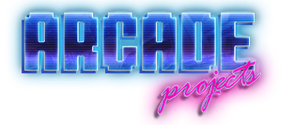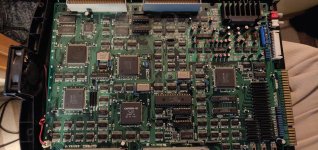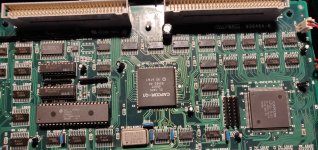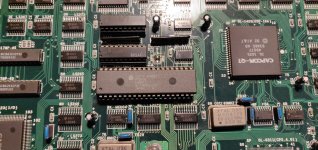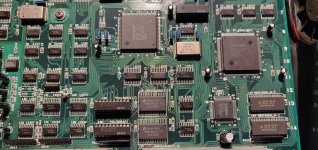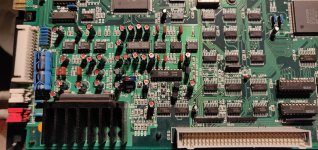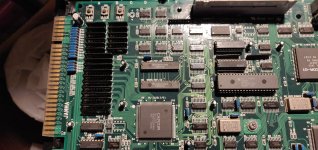Stupid Dufus
Grand Master
When I first joined I posted about it under the Darksoft multi support thread.. but really, it's a general A board problem, not related to the multi at all.
Anyway, the issue:
Bought as junk from YAJ with a working B board.
A board only powers on randomly with a game with full ROM set populated. Doesn't produce sound at all, regardless of setting mono or Q sound/stereo. No sound from JAMMA edge or RCA jacks. I've tried powering on with volume down held with no change.
If I connect a B board with the Razoola Suicide CPS2 test ROM, it powers on and displays text every time... but sound ROMs show an error, and no audio plays. But there are rare occasions it starts with no error, but still no sound.
I already did a shotgun approach and replaced all the capacitors in the sound section of the board with no change.
Attached are pics of the junk A board. When I compared it to my separate working A board, I noticed that this junk one has the CPU in a socket... and the CPU is labeled differently?
Is that different CPU the issue? Or is there something else I could try?
I don't have a logic probe or scope, so I imagine that makes things more difficult to diagnose.
Anyway, the issue:
Bought as junk from YAJ with a working B board.
A board only powers on randomly with a game with full ROM set populated. Doesn't produce sound at all, regardless of setting mono or Q sound/stereo. No sound from JAMMA edge or RCA jacks. I've tried powering on with volume down held with no change.
If I connect a B board with the Razoola Suicide CPS2 test ROM, it powers on and displays text every time... but sound ROMs show an error, and no audio plays. But there are rare occasions it starts with no error, but still no sound.
I already did a shotgun approach and replaced all the capacitors in the sound section of the board with no change.
Attached are pics of the junk A board. When I compared it to my separate working A board, I noticed that this junk one has the CPU in a socket... and the CPU is labeled differently?
Is that different CPU the issue? Or is there something else I could try?
I don't have a logic probe or scope, so I imagine that makes things more difficult to diagnose.
